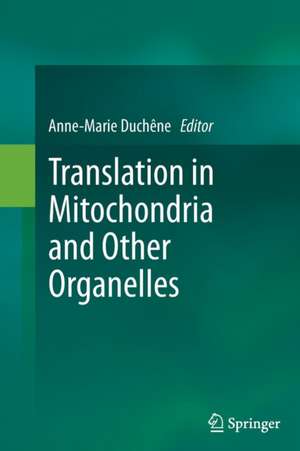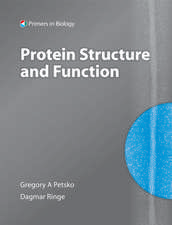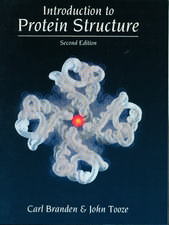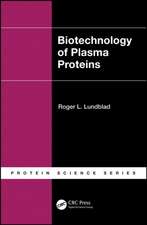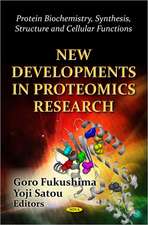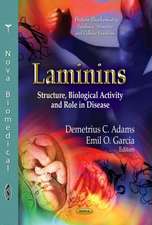Translation in Mitochondria and Other Organelles
Editat de Anne-Marie Duchêneen Limba Engleză Paperback – 26 aug 2016
| Toate formatele și edițiile | Preț | Express |
|---|---|---|
| Paperback (1) | 936.46 lei 6-8 săpt. | |
| Springer Berlin, Heidelberg – 26 aug 2016 | 936.46 lei 6-8 săpt. | |
| Hardback (1) | 941.16 lei 6-8 săpt. | |
| Springer Berlin, Heidelberg – 23 sep 2013 | 941.16 lei 6-8 săpt. |
Preț: 936.46 lei
Preț vechi: 1142.03 lei
-18% Nou
Puncte Express: 1405
Preț estimativ în valută:
179.35€ • 184.78$ • 150.24£
179.35€ • 184.78$ • 150.24£
Carte tipărită la comandă
Livrare economică 24 februarie-10 martie
Preluare comenzi: 021 569.72.76
Specificații
ISBN-13: 9783662511107
ISBN-10: 366251110X
Pagini: 271
Ilustrații: VI, 265 p. 44 illus., 36 illus. in color.
Dimensiuni: 155 x 235 x 14 mm
Greutate: 0.39 kg
Ediția:Softcover reprint of the original 1st ed. 2013
Editura: Springer Berlin, Heidelberg
Colecția Springer
Locul publicării:Berlin, Heidelberg, Germany
ISBN-10: 366251110X
Pagini: 271
Ilustrații: VI, 265 p. 44 illus., 36 illus. in color.
Dimensiuni: 155 x 235 x 14 mm
Greutate: 0.39 kg
Ediția:Softcover reprint of the original 1st ed. 2013
Editura: Springer Berlin, Heidelberg
Colecția Springer
Locul publicării:Berlin, Heidelberg, Germany
Cuprins
Structural aspects of mitochondrial ribosome function.- Mechanism and control of protein synthesis in mammalian mitochondria.- Translation in mammalian mitochondria : Order and disorder linked to tRNA and Aminoacyl-tRNA synthetases.- Mitochondrial targeting of RNA and mitochondrial translation in yeast and mammalians.- Mechanisms and control of protein synthesis in yeast mitochondria.- Mitochondrial translation in trypanosomatids.- Translation in mitochondria and apicoplasts in Apicomplexa.- Translation in mitochondria in green alga and higher plants.- Translation in flowering plant chloroplasts.- The chloroplasts as platform for recombinant proteins production.
Textul de pe ultima copertă
The present book gives an overview on the similarities and differences of the various translation systems. Moreover, it highlights the mechanisms and control of translation in mitochondria and other organelles such as plastids and apicoplasts in different organisms. Lastly, it offers an outlook on future developments and applications that might be made possible by a better understanding of translation in mitochondria and other organelles.
Mitochondria and plastids originate from the endosymbiosis of bacteria. Over the course of evolution, most of the bacterial genes have been lost or transferred to the nuclear genome. Present-day mitochondria and plastids retain only a vestige of the genome of the ancestral bacteria, but the few organellar-encoded protein genes remain essential and must be translated.
Organellar translation machineries present clear specificities compared to cytosolic translation machineries, but also from one organism to the other. The organellar translation machineries appear to consist of organellar-encoded and nucleus-encoded components. They rely on crosstalk between genomes and are predominantly controlled by specific mechanisms. Organellar ribosomes show clear differences compared to the ancestral bacterial ribosomes or to the cytosolic ones. Moreover, transfer RNAs and aminoacyl-tRNA synthetases are key components of protein-synthesizing systems, and a full set of both types of macromolecules is required in each compartment where translation occurs.
Organellar translations are increasingly becoming a subject of investigation. Translation dysfunctions in human mitochondria are responsible for numerous diseases, and organellar translation systems in some parasites offer potential targets for drug development. Lastly, chloroplasts can be used as platforms for the production of recombinant proteins.
Mitochondria and plastids originate from the endosymbiosis of bacteria. Over the course of evolution, most of the bacterial genes have been lost or transferred to the nuclear genome. Present-day mitochondria and plastids retain only a vestige of the genome of the ancestral bacteria, but the few organellar-encoded protein genes remain essential and must be translated.
Organellar translation machineries present clear specificities compared to cytosolic translation machineries, but also from one organism to the other. The organellar translation machineries appear to consist of organellar-encoded and nucleus-encoded components. They rely on crosstalk between genomes and are predominantly controlled by specific mechanisms. Organellar ribosomes show clear differences compared to the ancestral bacterial ribosomes or to the cytosolic ones. Moreover, transfer RNAs and aminoacyl-tRNA synthetases are key components of protein-synthesizing systems, and a full set of both types of macromolecules is required in each compartment where translation occurs.
Organellar translations are increasingly becoming a subject of investigation. Translation dysfunctions in human mitochondria are responsible for numerous diseases, and organellar translation systems in some parasites offer potential targets for drug development. Lastly, chloroplasts can be used as platforms for the production of recombinant proteins.
Caracteristici
Gives an overview on the different translation machineries? in the cell
Specifies mechanisms and control of translation in mitochondria and other organelles
Written by international experts in the field
Includes supplementary material: sn.pub/extras
Specifies mechanisms and control of translation in mitochondria and other organelles
Written by international experts in the field
Includes supplementary material: sn.pub/extras
